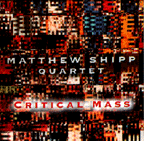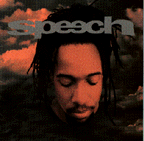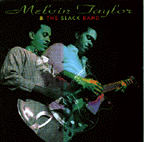

[ Metro | Metroactive Central ]
Audiofile
When the sound Amiri Baraka dubbed New Black Music first hit, it was dismissed as noisy hate music. But this stridently experimental idiom simply refused to go away. In the past few years, New Black Music has thrown up a number of artists--most notably David Ware, Charles Gayle, Matthew Shipp and William Parker--willing to push the music's borders even further. Pianist Shipp and his faithful rhythm mate, bassist Parker, are joined by violinist Mat Maneri and drummer Whit Dickey for Critical Mass. Shipp is a self-described spiritual and philosophical artist. Dispensing with horns, the quartet's sound is decentralized; no one instrumentalist dominates the proceedings, which makes it tough to find a fixed point of entry. Shipp's dense piano clusters simultaneously bring to mind Cecil Taylor's dark impenetrable sound and Monk's elliptical touch. Comprising three extended pieces, the recording is structured like a pyramid, each block of sound painstakingly constructed and fitted into the overall scheme. Critical Mass is a courageous effort to construct a spiritual temple of the future--church music without walls. (Nicky Baxter)
Like a combination of Spearhead's Home and the Jungle Brothers' Done by the Forces of Nature, Speech's selftitled album boasts flavor with a touch of social commentary. On his solo release, Speech has sharpened his familiar talents and showcased a few new ones. The basics--beats and rhymes--provide Speech's best moments: "Why U Gotta Be Feelin' Like Dat," "Freestyle #8 From Speech's Vault" and "Can U Hear Me?" are head-bobbing templates for others to copy. Speech also has a lot more on his mind than torching microphones; "Poor Little Music Boy," "If U Was Me" and "Let's Be Hippies" tap into Speech's strongest convictions. His keen sense of observation and politics on "Ask Someone Who Ain't (If You Think The System's Workin')" is reminiscent of Arrested Development's best tracks. Throughout the CD, Speech's singing voice is sweet and warm as oven-fresh bread. Expect this album to get zero airplay, but where you gonna put conscious rap you can play for your mom? Put it in your deck. (Todd S. Inoue)
Melvin Taylor's music has always been a knotty matter for record labels. Of course, he's a blues player--Mississippi born and bred, now residing in Chicago, adopted home of the genre. Thanks to a musically inclined uncle with a jones for Muddy Waters, Jimmy Reed and Lightnin' Hopkins, he knows his blues. But the fact is that Taylor's guitar speaks in multiple tongues. At 35, Taylor is a child of the 1970s and '80s, decades when blues was but one of a cornucopia of genres vying for attention. Thus, it should come as no surprise that the guitarist is as influenced by Jimi Hendrix and Wes Montgomery as by Muddy's citified boogie. Given the stylistic constraints U.S.-born African musicians often confront (wherein they are expected to play "pure black music" but not rock & roll), it is not too surprising that Melvin Taylor & the Slack Band is Taylor's first domestic release. A bluesy experience, the trio is surprisingly full-sounding. Like Hendrix, Taylor is a preternaturally gifted virtuoso, alternately ripping off stinging leads and driving rhythmic patterns. Though serviceable as a tunesmith, Taylor excels in choosing tunes to cover. Material by Albert King, T-Bone Walker and Hendrix is retooled to fit Taylor's needs. And, saving his tastiest licks for last, he turns "Tequila" (yes, that one) into a Wes Montgomery-cum-George Benson jazz workout. (Nicky Baxter)
[ Metro | Metroactive Central ]

Matthew Shipp Quartet
Critical Mass
213CD

Speech
Speech
EMI

Melvin Taylor and the Slack Band
Melvin Taylor and the Slack Band
Evidence